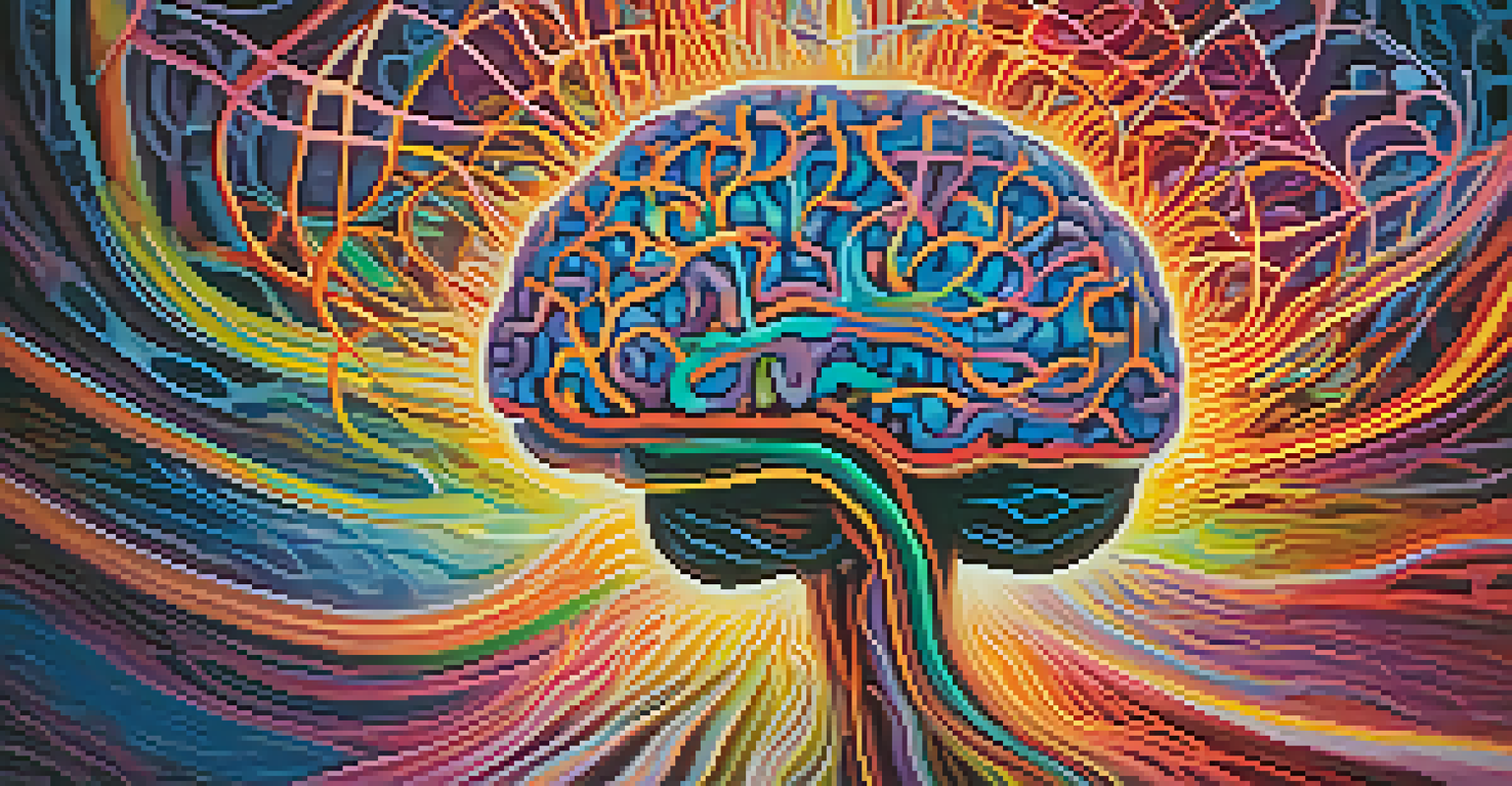Can Psychedelics Reveal Objective Reality or Just Illusions?

Understanding Psychedelics: A Brief Overview
Psychedelics are substances that alter perception, mood, and cognitive processes. Common examples include LSD, psilocybin (magic mushrooms), and DMT. These compounds have been used traditionally in various cultures for spiritual and healing purposes, raising questions about their role in understanding reality.
Psychedelics are a tool for consciousness exploration, revealing the complexities of our minds and the nature of reality.
When ingested, psychedelics can create vivid visual and auditory hallucinations, leading users to experience the world in profoundly different ways. Some users report a sense of connectedness to the universe, while others may confront deep-seated fears or memories. This duality highlights the complex nature of these substances.
As we delve deeper into the effects of psychedelics, we must consider whether these experiences provide insights into an objective reality or merely reflect the minds of the users. This inquiry forms the foundation for exploring their potential benefits and risks.
The Nature of Reality: Objective vs. Subjective
To understand the impact of psychedelics, we first need to differentiate between objective and subjective reality. Objective reality refers to the world as it exists independently of our perceptions, while subjective reality is shaped by individual experiences and interpretations. This distinction is crucial when examining the effects of psychedelics.

Many proponents argue that psychedelics can strip away the layers of social conditioning, allowing users to glimpse a more authentic version of reality. For instance, experiences of profound unity with nature or insights into personal truths can feel like accessing objective reality, even if they stem from subjective experiences.
Psychedelics Alter Perception
Psychedelics like LSD and psilocybin can profoundly change how users perceive reality, leading to unique experiences and insights.
On the other hand, skeptics contend that these experiences are merely illusions, shaped by altered brain chemistry. They argue that what feels real in a psychedelic state may just be a byproduct of the mind's creativity, not a reflection of an underlying truth.
Psychedelics and the Brain: What Science Says
Recent scientific research has begun to illuminate how psychedelics affect the brain. Functional MRI studies show that these substances can create new connections between regions that typically don't communicate, leading to a unique state of consciousness. This phenomenon might explain the profound insights some users report.
The experience of psychedelics can lead to profound insights that challenge our understanding of self and existence.
For example, studies have found increased activity in the default mode network (DMN), a brain network associated with self-referential thoughts and the sense of ego. This heightened activity can lead to experiences that feel transcendent or enlightening, further blurring the lines between subjective and objective reality.
However, while these findings are fascinating, they also raise questions. If psychedelics can manipulate brain function to create a heightened sense of awareness, how can we determine what is real versus what is an illusion crafted by our own minds?
Personal Experiences: Insights or Illusions?
When discussing psychedelics, personal anecdotes are often at the forefront. Many users share transformative experiences, claiming insights that forever change their perspectives on life, relationships, or spirituality. These narratives can be compelling, suggesting that psychedelics might reveal deeper truths about existence.
However, it's essential to approach these stories with a critical eye. While one person may feel they've discovered the meaning of life during a trip, another might interpret similar experiences as mere psychological phenomena. This variability underscores the subjectivity of psychedelic experiences.
Cultural Views Shape Experiences
Different cultures have varying interpretations of psychedelics, influencing whether they are seen as spiritual tools or simply recreational substances.
Ultimately, these personal experiences highlight the ongoing debate: are these insights genuine revelations of objective reality, or simply reflections of individual psyche? The answer may vary greatly from one person to another.
Cultural Perspectives on Psychedelics
Throughout history, various cultures have embraced psychedelics for spiritual and healing practices. Indigenous groups in the Amazon have long used ayahuasca, a psychedelic brew, for rituals aimed at connecting with the spirit world. These cultural contexts offer valuable insights into how psychedelics are perceived as pathways to reality.
In contrast, modern Western society often views psychedelics through a lens of skepticism and caution, primarily associating them with recreational use and potential harm. This dichotomy raises questions about the varying interpretations of reality shaped by cultural beliefs and values.
By examining these cultural differences, we can better understand how societal norms influence our perceptions of psychedelics. This exploration may reveal that the quest for objective reality is deeply intertwined with cultural narratives and individual experiences.
Therapeutic Potential: A Path to Healing?
In recent years, there has been a resurgence of interest in the therapeutic potential of psychedelics. Studies suggest that substances like psilocybin and MDMA may help treat conditions such as PTSD, depression, and anxiety. This therapeutic angle often leads to discussions about whether psychedelics can reveal truths about the self that facilitate healing.
Patients often describe their psychedelic experiences as enlightening, providing clarity about their emotions, traumas, or interpersonal relationships. Such revelations can feel like unlocking a deeper understanding of oneself, hinting at an underlying objective reality about personal struggles.
Therapeutic Uses Show Promise
Emerging research indicates that psychedelics may help treat mental health conditions, revealing deeper truths about individuals that facilitate healing.
Nevertheless, the therapeutic use of psychedelics also raises ethical questions. If these experiences blur the lines between reality and illusion, how can we ensure that the insights gained during sessions are genuinely beneficial and not merely reflections of altered perceptions?
The Future of Psychedelics and Reality Exploration
As research on psychedelics continues to evolve, so do the discussions surrounding their implications for understanding reality. The growing acceptance of psychedelics in therapeutic settings suggests a shift in the narrative, moving from stigma to recognition of their potential benefits. This shift could pave the way for more profound explorations of consciousness.
However, with this newfound interest comes the responsibility to approach psychedelics with caution. As we navigate these uncharted waters, it’s crucial to differentiate between genuine insights and illusions. Education and continued research will be vital in ensuring safe and informed use of these substances.

Ultimately, the question of whether psychedelics reveal objective reality or illusions remains open. As we continue to explore this fascinating intersection of science, culture, and personal experience, we may find that the truth is more complex than we initially thought.